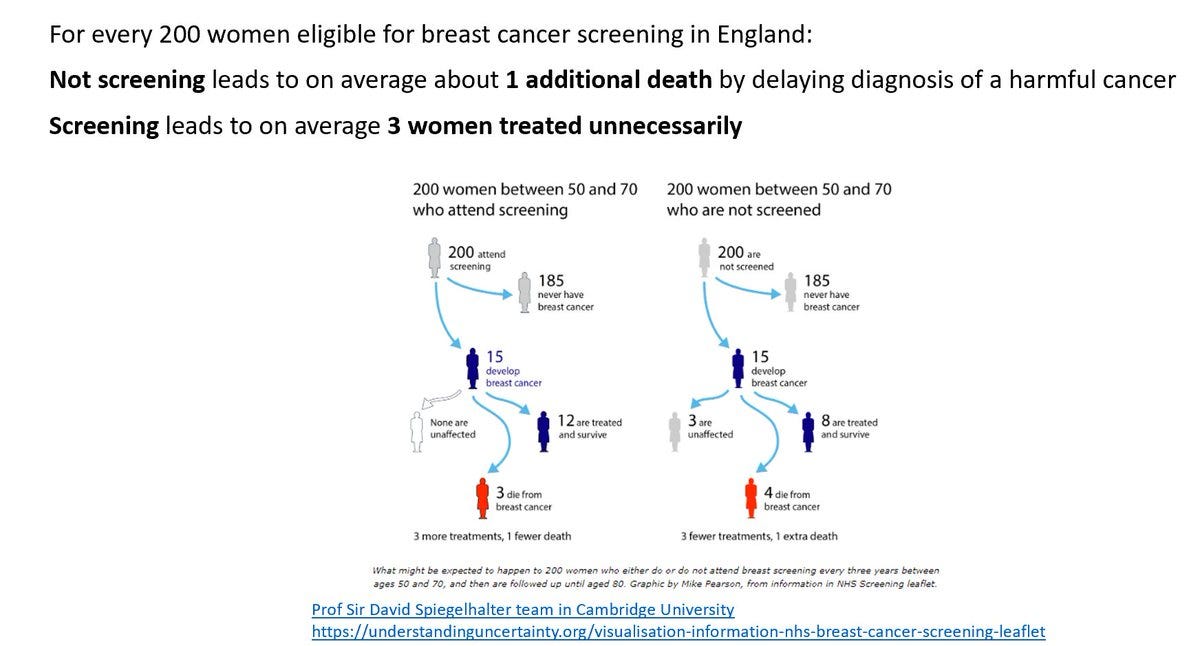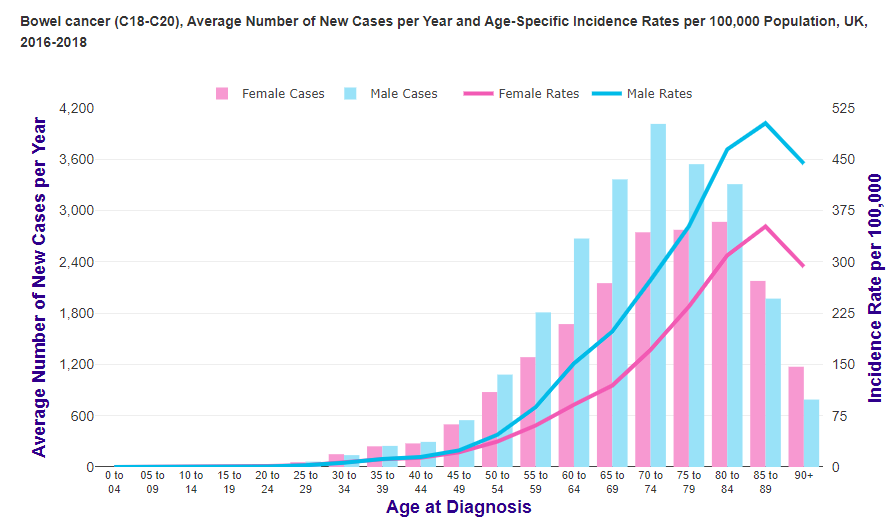ARCHIVE: Cancer screening in the UK - always a good thing?
A look at the pros and cons of cancer screening from August 2023
Various new or expanded cancer screening programmes have been announced recently in England and coverage has been overwhelmingly on the pros. But there are cons too.
So let's explore some of the pros and cons... This post is an expansion of my Guardian article.
First a screening recap : a relatively simple test that flags potential cause for concern. If flagged, you are offered more, gold standard, testing, often in a hospital (e.g. MRI scans, blood tests, other diagnostic procs). If those +Ve too, you are offered cancer treatment.
The benefits are clear: If you have undiagnosed serious cancer, screening can save your life if it leads to earlier treatment.
In this case massively beneficial to you *and* to NHS which can save on longer, more expensive treatment from later diagnosis.
BUT large majority of people screened DON'T have cancer, or at least not one that will damage them in their lifetime. This is where screening can actively harm.
Cos screening tests are not perfect, some people without a harmful cancer will get flagged for further tests.
Best case for them: cancer will be ruled out on gold standard tests, but even then, many will experience significantly increased anxiety lasting weeks or months.
Worst case for them (v unlikely but does happen): they have a false positive on gold standard tests too.
In that case, someone can receive *uneccesary* harmful & expensive treatment.
This is more common in breast & prostate cancers - and why NHS don't offer routine screening for prostate cancer - but it can happen for other cancers too.
see also this recent Guardian article on benefit of cancer screening.
Screening is also not a one off, but happens regularly - and as we get older, often for more than one cancer.
Our chance of being wrong flagged for testing, or worse, wrongly treated, increases the more times, and the more conditions, you are screened for.
So for individuals, we need to weigh up benefit of having a cancer detected earlier vs chance of being wrongly send for further testing (& anxiety that comes with that) or (much rarer, but much worse) wrongly treated.
NHS actually very good at making that clear to people!
For the NHS, screening millions of people, vast majority of whom don't have cancer, is v resource intensive to deliver (esp e.g. MRI scans vs a blood test).
To expand screening, NHS needs not JUST extra screening capacity but ALSO extra gold standard test & treatment capacity.
And - in the v resource constrained system which we have right now - every person flagged by screening who does not have cancer but is given gold standard testing, is using capacity not available for someone else.
To expand screening, we need to extra capacity throughout.
The extent of the harm of screening depends on 5 things (see image).
The lower each of them are, the less harm there is
At the lowest harm end is bowel cancer, but even that raises questions for NHS - let's dig into some numbers to illustrate.
Potentially pre-cancerous polyps are in about 25% of people of screening age, the home stool test is low burden, colonoscopy gold standard test can also be treatment (removes polyps) & almost impossible to falsly diagnose cancer with a colonoscopy.
So what's the issue?
There are 8 million people in England in their 50s vs 9 million 60-74 yr olds previously offered screening, and 50-somethins about half as likely to have cancer as 60-74s, so NHS screening millions more people who won't benefit.
But stool testing not perfect. Even if only 1-2% of people are wrongly flagged for colonoscopies, that still represents thousands more people referred each year.
When expansion to 50s somethings was decided in 2018, 25% of patients waited >6 week target for colonoscopy.
Things are much worse now & deteriorating - 40% of people waited >6 weeks in 2023.
Colonoscopies are already one of the procedures NHS is trying to find private health care providers to help with.
We need serious plans for how to resource colonoscopies - inc workforce!
I am sure that, IF sufficient resource, there is significant cost benefit in extending bowel cancer screening - and for someone over 50, taking up screening is beneficial.
But right now, which other patients needing a colonoscopy will miss out by adding 1000s more to the list?
The heralded new blood test for 50 types of cancer is potentially even more difficult for NHS to cope with (and more harmful to individuals).
The test was designed for those with non specific symptoms (e.g. fatigue, weight loss) that might be (but probably isn't) cancer.
In tests on those with non-sepcific symptoms, about 7% ended up having cancer. 66% of those with cancer tested positive on the blood test AND 1.5% of those *without* cancer tested positive too (false positive).
The test wasn't sensitive enough to rule out cancer but was *very* useful for identifying where possible cancers might be - *in people who already have worrying symptoms*.
But NHS wants to use it on people who *don't* have any symptoms at all.
They're currently trialling it on 140,000 non-symptomatic people and hope to roll it out to a million people.
This population is *much less* likely to have cancer than those with symptoms! (let's assume 2% instead of 7%).
Of the 980,000/1,000,000 without cancer, almost 15,000 might get sent for a battery of gold standard tests they don't need.
Overall (inc those with cancer), NHS needs to find capacity for another ~30K people who would not be in system at all right now (no symptoms).
Again, if we had spare capacity in our cancer diagnostic pathways, that could be ok. But we don't.
Cancer diagnostic waits are getting longer & are way above target. Adding 1000s more means others, many with symptoms & more advanced disease, might have to wait to longer.
Finally, earlier detection does *not* always mean longer life. This is from something called the "lead time" bias and it actually really important to understand! Kit Yates did a great thread on it.
The benefits, harms and costs of screening need to be transparently communicated to the public.
NHS leaflets good for individual but the broader discussion of impact on NHS resources is just not happening.
To expand screening, what is the plan for increasing capacity?























